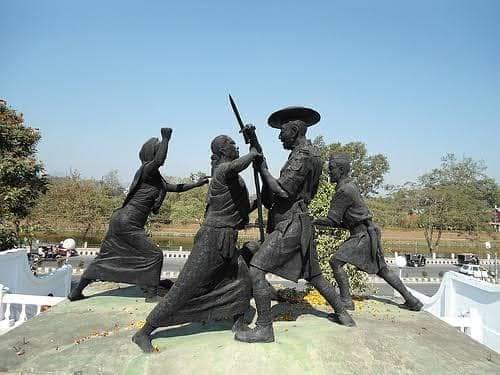The Southern Angami Public Organisation (SAPO) has unanimously decided to prohibit Mao residents from entering the Southern Angami areas with effect from December 15, over issues about the dispute at Kezoltsa area.
Informing this in a press release on Friday, SAPO President Kevipodi Sophie and General Secretary Swelul Pucho stated that such a resolution was necessitated after an “act of undesirable aggression” on the part of the Mao Council despite the matter being put up for adjudication in the Tenyimi customary law in the before the Board of Arbitration in the Court of the Tenyimi People’s Organisation.
The decision was taken during the SAPO’s general body meeting at SAPO Hall, Jakhama on December 7.
Justifying its decision, the SAPO explained that differences over the traditional land holding within Kezoltsa arose between the Mao-Maram people of Manipur State and the Southern Angami people of Nagaland State. However, since “tribal land and its resources belong to the people and not to the government,” and every traditional land of the Nagas has its clear-cut demarcated traditional boundary criss-crossing the arbitrarily created political boundary, it became a contentious matter in the TPO.
Accordingly, in 2016, the Board of Arbitration of Tenyimi People’s Court persuaded the parties to resolve their differences amicably by respecting each other’s customary usages and practices under the customary law, and the contested areas were handed to the TPO for adjudication based on identifying the genuine land owners in consonance with customary usages and practices.
However, during the pendency of the case, it alleged that the Mao Council, with the help of the Manipur Government, threatened the peaceful co-existence and security of the region, “by harboring and deploying the Manipur Arms security personnel, using CrPc 144 and forcefully constructing illegal roads, houses, electrification, organizing unlawful activities such as the demolition of the rest house in the Southern Angami areas and constructing an illegal alternative route to Dzukou.” This, the SAPO stated was a “direct insult, humiliation, and a challenge to the Board of Arbitration of TPO Court, and the Southern Angami people,” it added.
Lamenting that this “illegal act of aggression” prohibits the TPO and its judiciary board from resolving the matter, the SAPO called upon the Mao Council and the Manipuri Government to cease all activities within the disputed land and urged the Mao Council to reaffirm the arbitration undertaking.
“Since both the disputing parties are traditionally, brothers, it would be unfortunate to allow any grave consequences to the situation causing bitterness within the brotherhood,” it added.
Despite trying to maintain healthy relationships with the Tenyimi Mao people, “the undesirable activities carried out by them has compelled us to take precautionary measures as any eventuality and the undesirable incident may be anticipated in the future,” SAPO stated while informing that from December 15 onwards, it would “restrict/prohibit Mao citizen to travel/enter in the Southern Angami areas.”
“Any untoward incident as a consequence of the violation of this directive will be understood as an act of your own volition and the Southern Angami people will not be held responsible,” it stated.
Meanwhile, the SAPO reaffirmed its support to the TPO and the Board of Arbitration to resolve the issues and expedite the matter in the principle of natural justice keeping in mind the traditional laws of the land.
SAPO has been torturing the Mao residents on various occasions in the past due to Dzuko valley issue. In 2015, growing tension between Southern Angami People’s Organisation (SAPO) and Mao Council took a new turn when SAPO volunteers and members restricted the movement of Mao travelers to neighboring Nagaland State.
SAPO volunteers came out on NH-2 between Khuzama and Kegwima in the Southern Angami areas and stopped passenger ferrying vehicles including Tata Sumo, inter-State buses, and Wingers to enquire about the ethnic identities of the passengers. Passengers belonging to the Mao community and their vehicles were sent back and asked not to travel to Nagaland with immediate effect.
Earlier in March this year also, SAPO had called the indefinite bandh in connection to “permanent structures” and “deployment of armed personnel” by the Manipur government at what it referred to as the “disputed” Southern Angami areas.

Signpost News is an Imphal-based media house that focuses on delivering news and views from Northeast India and beyond.

